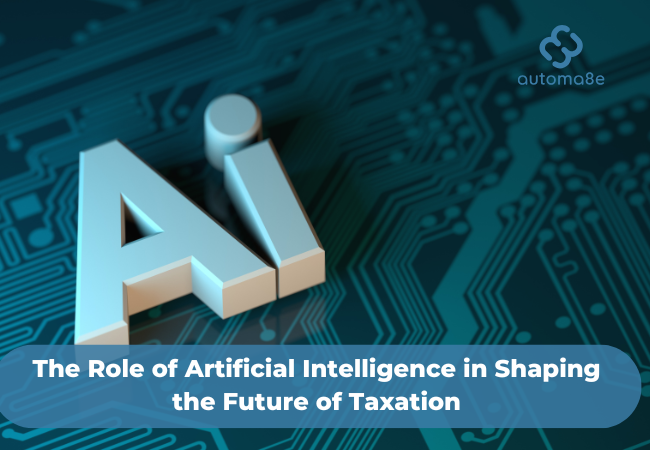In an increasingly digitized world, Artificial Intelligence (AI) is emerging as a transformative force across industries, including taxation. As tax systems become more complex, AI’s ability to automate processes, enhance compliance, and provide strategic insights is proving invaluable. This blog delves into the evolving role of AI in taxation, its benefits, challenges, and the road ahead for businesses and governments.
In this blog, we’ll explore:
- The Need for AI in Modern Taxation
- Automating Tax Compliance and Reporting
- Navigating Complex Tax Regulations
- Strategic Tax Planning and Optimization
- AI in Tax Administration: A Government Perspective
- Challenges and Ethical Considerations
1. The Need for AI in Modern Taxation
Taxation systems globally are under pressure to adapt to growing data volumes, dynamic regulations, and sophisticated compliance requirements. Traditional manual methods struggle to keep pace, leading to inefficiencies, errors, and non-compliance. This is where AI steps in as a game-changer. By leveraging machine learning, natural language processing, and predictive analytics, AI addresses these pain points with unprecedented precision and speed.
2. Automating Tax Compliance and Reporting
One of AI’s most significant contributions to taxation is automating compliance and reporting processes. Tax compliance involves:
- Gathering data from multiple sources.
- Validating the accuracy of records.
- Preparing and submitting returns.
AI streamlines these tasks by:
- Automating Data Collection: AI-driven systems integrate with financial platforms to collect data in real-time, reducing manual effort.
- Error Detection: Machine learning algorithms identify inconsistencies, flagging potential errors for review before submission.
- Timely Reporting: Automated workflows ensure deadlines are met, mitigating penalties for late filings.
For instance, AI-powered tax tools like Vertex and Avalara simplify GST/VAT calculations and filings, ensuring businesses remain compliant across jurisdictions.

3. Enhancing Tax Audits and Fraud Detection
AI has revolutionized the auditing process by:
- Analyzing vast amounts of financial data.
- Identifying unusual patterns or anomalies indicative of tax evasion.
- Prioritizing cases with higher risks for manual review.
Tax authorities like the IRS and HMRC use AI to uncover fraudulent activities, significantly improving recovery rates. For example, AI can detect mismatches between reported income and third-party data sources, such as bank statements or payroll systems, with remarkable accuracy.
4. Navigating Complex Tax Regulations
The ever-evolving nature of tax laws poses a constant challenge for businesses. AI simplifies this by:
- Monitoring Legislative Changes: AI systems scan legal databases and government portals for updates in real-time.
- Providing Interpretations: Natural language processing enables AI to summarize complex legal jargon into actionable insights.
- Predictive Compliance: Businesses receive proactive recommendations to adjust their operations in line with new regulations.
For example, AI tools like Thomson Reuters ONESOURCE help organizations stay compliant by offering real-time updates and automated tax code applications.

5. Strategic Tax Planning and Optimization
AI goes beyond compliance by empowering businesses to optimize their tax strategies. Key applications include:
- Scenario Analysis: AI simulates various tax strategies, predicting their financial outcomes.
- Tax Credit Identification: AI identifies eligible credits and deductions, maximizing savings.
- Cash Flow Forecasting: Businesses can plan for tax liabilities with better accuracy, improving financial stability.
Such capabilities enable organizations to align their tax planning with broader business goals, fostering long-term growth.
6. AI in Tax Administration: A Government Perspective
Governments are also leveraging AI to modernize tax administration:
- Improved Revenue Collection: AI-powered systems identify under-reported income and reduce tax gaps.
- Efficient Processing: Automated systems handle large volumes of tax returns, reducing backlogs.
- Enhanced Transparency: AI improves public trust by minimizing biases and ensuring equitable tax enforcement.
Countries like Singapore and Australia have adopted AI-driven e-tax systems to streamline processes and enhance citizen experiences.

7. Challenges and Ethical Considerations
Despite its advantages, integrating AI into taxation comes with challenges:
- Data Privacy: Ensuring the security of sensitive taxpayer information is paramount.
- Algorithmic Bias: AI systems must be carefully designed to prevent unintentional discrimination.
- Transparency: Stakeholders need clear explanations of AI-driven decisions to foster trust.
Governments and businesses must establish robust frameworks for ethical AI use, prioritizing accountability and fairness.
8. The Future of AI in Taxation
The potential of AI in taxation is vast. Emerging trends include:
- Real-Time Taxation: Instant calculation and deduction of taxes at the point of transaction.
- Custom AI Models: Tailored solutions for industry-specific tax challenges.
As AI technologies evolve, collaboration between tech providers, governments, and businesses will be crucial to realizing its full potential.
FAQs about AI in Taxation
AI in taxation automates complex tasks, enhances compliance, detects fraud, streamlines reporting, and improves strategic tax planning. It simplifies navigating dynamic tax regulations while reducing manual errors.
AI automates data collection, error detection, and tax filing processes. It ensures accurate and timely reporting by integrating with financial systems to monitor compliance in real-time.
AI tools simulate tax scenarios, identify tax-saving opportunities like deductions or credits, and optimize cash flow forecasting, helping businesses make data-driven financial decisions.
Ethical concerns include data privacy, algorithmic bias, and transparency in AI decision-making. These require robust governance frameworks to ensure accountability and trust.
Challenges include high implementation costs, integrating AI with existing systems, ensuring data security, and addressing regulatory compliance across jurisdictions.
The future includes integrating blockchain for transparency, real-time tax computation, and creating industry-specific AI models to tackle unique tax challenges.
Final Insights
Artificial Intelligence is reshaping the future of taxation, driving efficiency, accuracy, and strategic value for stakeholders. By embracing AI, businesses can simplify compliance, optimize planning, and navigate complex regulations with confidence. Meanwhile, governments can enhance revenue collection, improve transparency, and build trust in the tax system. As we move forward, the integration of AI in taxation promises a more equitable and efficient fiscal landscape, paving the way for sustainable growth.
